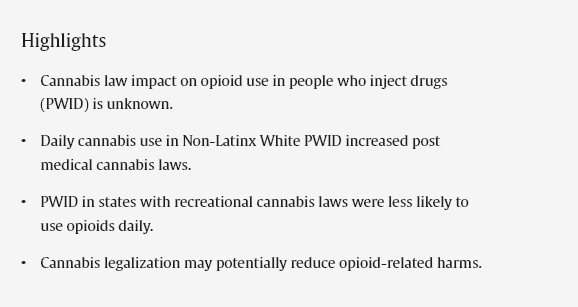The role of cannabis reform in shaping North America’s overdose and addiction crisis remains hotly contested. People who inject drugs (PWID) sometimes substitute cannabis for opioids. Yet, no research has examined the effects of cannabis legalization on opioid use among PWID– despite major potential for PWID to benefit from policy interventions reducing opioid-related harms. We examined whether legalizing cannabis for medical use (MCL) vs. both MCL and adult/recreational use (MCL+RCL) was associated with changes in substance use among PWID, overall and by sex and race/ethnicity.
-
-
With over 55 million cannabis fans in America, 2025 was a year of big wins and stinging losses. From headway in the hash world and LA’s indoor farms to High Times’ resurgence and landmark findings in the scientific world, the ganja news came like a firehose in 2025, and here’s a distillation of the top items.
-
As we reported previously, scientists from the University of New Mexico have been studying how access to marijuana may help alleviate the opioid crisis, declared a national emergency by President Trump. Their study has now been published in the journal PLOS One, with the researchers concluding that there is “clinically and statistically significant evidence” that increased cannabis use led to patients cutting down on opioids and improved their quality of life.
The study analyzed the health data of 66 patients who were using opioids habitually to manage their severe chronic pain. 37 of the patients were enrolled in a medical marijuana program between 2010 and 2015 while 29 patients in the control group were not.
The scientists found that patients using cannabis were 17 times more likely to stop their prescribed opioids and five times more likely to lower their daily dosage of opioids. On average, they cut their doses in half. Comparatively, the patients not enrolled in the medical marijuana program actually increased their opioid usage by more than 10%.
http://bigthink.com/paul-ratner/how-legalizing-marijuana-may-end-the-opioid-crisis
-
-
The clinically and statistically significant evidence of an association between MCP enrollment and opioid prescription cessation and reductions and improved quality of life warrants further investigations on cannabis as a potential alternative to prescription opioids for treating chronic pain.
Study: http://journals.plos.org/plosone/article?id=10.1371%2Fjournal.pone.0187795
-
MPs passed the Liberal government’s bill to legalize cannabis Monday evening, sending the legislation down the hall to the Senate for further study and debate.
The legislation was largely supported along partisan lines, although it secured the support of the NDP and Green Party Leader Elizabeth May. The final vote was 200 MPs in favour, with 82 against. Conservative MP Scott Reid voted for the bill after he polled constituents in his eastern Ontario riding, Lanark—Frontenac—Kingston, and found a plurality supported the Liberal plan.
A last-ditch Conservative effort to delay the bill — and send it to the Commons health committee for further study — failed by a vote of 83 to 199 with some Bloc Québecois MPs voting with Tory legislators. Conservative opposition will now fall to their national caucus colleagues in the Red Chamber, where some senators have already signalled they are prepared to give the bill a rough ride. Some Tories have said the government’s timeline for legalization, July 1, 2018, is far too ambitious.
Continues: http://www.cbc.ca/news/politics/cannabis-legalization-legislation-1.4421910
-

By Philippe Lucas, CARBCCannabis is neither completely harmless, nor is it a cure-all, but with polls showing that Canadians overwhelmingly support cannabis policy reform, it’s fair to assume that most people no longer believe that legalization would lead to the end of the world. Yet, some who support reform nonetheless have concerns that adding yet another legal drug (alongside alcohol, tobacco and pharmaceuticals) for society to struggle with might result in an increase in use.
But what if the legalization of adult access to cannabis also resulted in a reduction in the use of alcohol and other drugs? What if rather than being a gateway drug, cannabis actually proved to be an exit drug from problematic substance use? A growing body of research on a theory called cannabis substitution effect suggests just that.
-
Recent elections in the states of Washington and Colorado have legalized marijuana, catalyzing the national debate regarding drug policy and reform. Would it be easier on health and police departments now pulled between conflicting state and federal laws to just legalize marijuana? Underwritten by Booz Allen Hamilton
Featuring Ethan Nadelmann, Asa Hutchinson, and James Bennet
-


